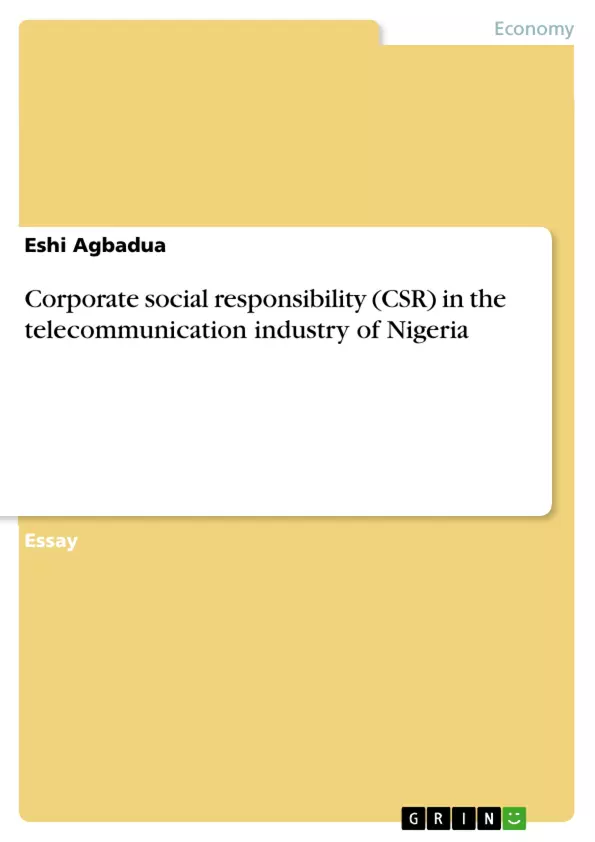In a contemporary competitive market, the correlation between corporate social responsibility (CSR) and profitability cannot be overemphasised. Multinational companies gain economic and competitive advantage by active involvement in social responsible programs and good ethical practices. This essay analyses the level of impact of CSR activities in the telecommunication sector of Nigeria using different established theoretical views and approaches. Also, the adverse effects of the telecom operator’s business operation on the environment are delineated. An approach is recommended for the telecom operators to foster a common interest of all stakeholders in the industry.
Inhaltsverzeichnis (Table of Contents)
- A CRITICAL ANALYSIS OF CORPORATE SOCIAL RESPONSIBILITY (CSR) IN THE TELECOMMUNICATION INDUSTRY OF NIGERIA
- CSR: An Overview
- CSR in the Telecommunication Sector
- Stakeholders in the Telecommunication Sector
- CSR Theories and Perspectives
- Carroll’s Pyramid of CSR
- Economic Responsibility in the Telecommunication Industry
- Legal Responsibility in the Telecommunication Industry
- Ethical Responsibility in the Telecommunication Industry
- Philanthropic Responsibility in the Telecommunication Industry
- The Influence of the Environment in CSR
- The Impact of Telecommunication Masts on the Environment
- The Need for Sustainable Development
- Government Regulations and Policies
- Conclusion
Zielsetzung und Themenschwerpunkte (Objectives and Key Themes)
This essay aims to analyze the impact of Corporate Social Responsibility (CSR) activities in the telecommunication sector of Nigeria. It explores the level of impact of these activities, considering different theoretical perspectives and frameworks, and examines the adverse effects of telecom operators' business operations on the environment. The essay proposes an approach to foster a common interest among all stakeholders in the telecommunication industry.
- The role of CSR in the telecommunication industry of Nigeria
- The impact of CSR activities on various stakeholders
- The relationship between corporate profits and social responsibility
- The environmental impact of telecommunications infrastructure
- The need for a sustainable approach to telecommunication development
Zusammenfassung der Kapitel (Chapter Summaries)
- The essay begins by defining and exploring the historical development of CSR, outlining its relevance in contemporary business practices.
- It then focuses on the Nigerian context, highlighting the country's CSR policy and its implementation in the telecommunication sector.
- The essay identifies key stakeholders in the telecommunication industry, analyzing their expectations and the implications of CSR activities for each group.
- It examines various CSR theories, including stakeholder theory and Carroll's Pyramid of CSR, providing a framework to analyze the practices of Nigerian telecom operators.
- The essay further investigates the economic, legal, ethical, and philanthropic responsibilities of telecommunication companies, exploring their current practices in Nigeria.
- The essay delves into the environmental impact of the telecommunication industry, specifically focusing on the detrimental effects of electromagnetic radiation and diesel-powered generators.
- The essay emphasizes the need for sustainable development in the telecommunication sector, urging operators to adopt green energy solutions and reduce their environmental footprint.
- It concludes by highlighting the importance of integrating CSR into all aspects of telecommunication business practices, promoting a sustainable and ethical approach to development.
Schlüsselwörter (Keywords)
The primary keywords and focus topics of this text include corporate social responsibility, telecommunications industry, Nigeria, stakeholders, environmental impact, sustainable development, triple bottom line, electromagnetic radiation, diesel generators, and green energy solutions.
- Citation du texte
- Eshi Agbadua (Auteur), 2013, Corporate social responsibility (CSR) in the telecommunication industry of Nigeria, Munich, GRIN Verlag, https://www.grin.com/document/353792



